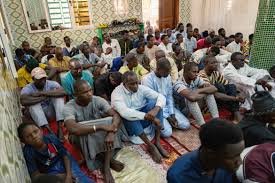Senegal men’s initiative boosts support for women’s health and advances gender equality in local communities.
On a recent evening in Senegal’s capital, Dakar, an Imam named Ibrahima Diane explained to a group of men why they ought to be more involved in household chores.
“The prophet himself says that a man who does not help to support his wife and children is not a good Muslim,” said the 53-year-old, as he described bathing his baby and assisting his wife with other duties.
Some of the men chuckled, not entirely convinced, while others applauded.
Diane was participating in a “school for husbands”, a United Nations-backed initiative in which respected male community members learn about “positive masculinity” in relation to health and social issues, and promote these concepts within their communities.
In Senegal, as in many other West African countries with large rural or conservative populations, men often have the final say in major household decisions, including those related to health.

Women may require their husbands’ permission for life-changing decisions, such as accessing family planning or other reproductive health services, as well as hospital deliveries or prenatal care.
After attending the school for husbands, Diane regularly delivers sermons during Friday prayers, in which he discusses issues around gender and reproductive health, from gender-based violence to combating stigma surrounding HIV.
“Many women appreciate my sermons,” he said. “They say their husbands’ behaviour has changed since attending them.” He added that some men have told him the sermons inspired them to become more caring husbands and fathers.
The programme was launched in Senegal in 2011, but in recent years has attracted the attention of the Ministry of Women, Family, Gender and Child Protection, which regards it as an effective strategy for combatting maternal and infant mortality.
“Without men’s involvement, attitudes towards maternal health will not change,” said Aida Diouf, a 54-year-old female health worker who collaborates with the programme. Many husbands prefer their wives not to be treated by male health workers, she explained.
Discussions for men have also focused on girls’ rights, equality, and the harmful effects of female genital mutilation. The programme now operates at least 20 schools throughout Senegal, and more than 300 men have been trained.
In some communities, men who once enforced patriarchal norms now promote gender equality, a shift which has led to a reduction in the number of forced marriages and greater acceptance of family planning, according to Senegal’s Ministry of Gender.
Men join the groups after being recruited based on trust, leadership and commitment. Candidates must be married, respected locally, and supportive of women’s health and rights.
After training, the men serve as peer educators, visiting homes and hosting informal discussions.
Although maternal and infant deaths in Senegal have declined over the past decade, experts say there is still much progress to be made. The country recorded 237 maternal deaths per 100,000 live births in 2023, and 21 newborns out of every 1,000 died within their first month. The UN’s global target is to reduce maternal deaths to 70 per 100,000 live births and newborn deaths to under 12 per 1,000 by 2030. A key problem is that many women have continued to give birth at home, said El Hadj Malick, one of the programme’s coordinators.
“By educating men about the importance of supporting their wives during pregnancy, taking them to hospital and helping with domestic work at home, you are protecting people’s health,” Malick said.
He noted that he still encounters difficulty in changing attitudes on some issues.
“But when we focus on women’s right to be healthy, it gives a human face to the concept and it becomes universal,” Malick said.
Additional Source: Aljazeera




